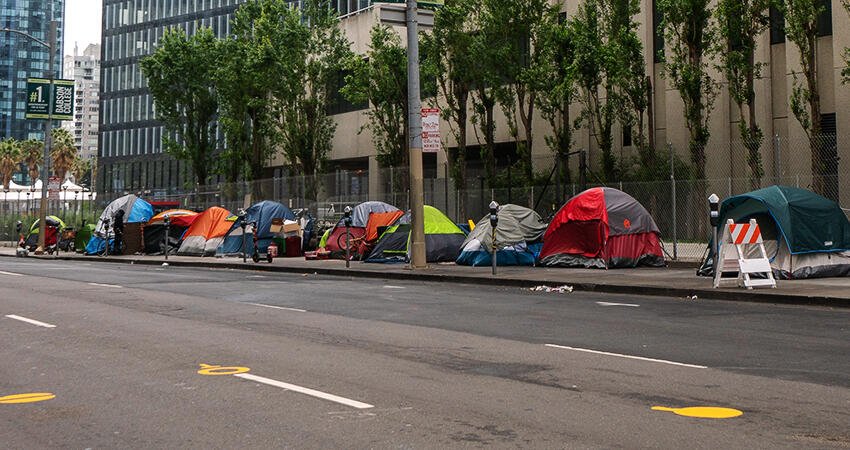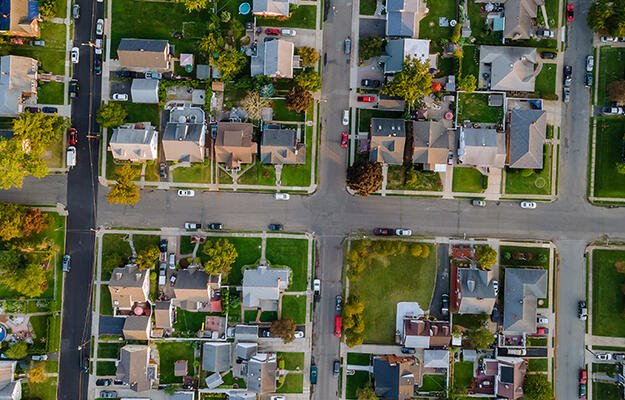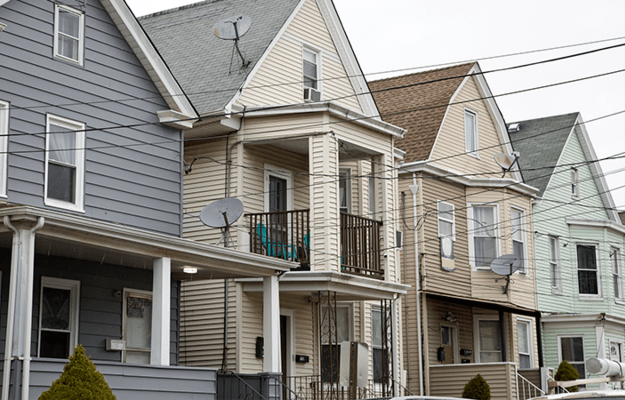
DianeBentleyRaymond/Getty Images
How Quality-of-Life Policing Harms People Experiencing Homelessness
- Title:
-
Complaint-Oriented Policing: Regulating Homelessness in Public Space
- Author:
-
Chris Herring
- Source:
- Publication Date:
In recent years, cities across the US have increasingly enacted ordinances that ban the everyday activities of people experiencing homelessness, known as quality-of-life offenses, such as bans on camping, sitting or lying in public, and loitering or panhandling. In the same period, the number of 911 and 311 calls from third parties filing complaints about these activities has increased, which subsequently affects how police respond to people experiencing homelessness. In this article, the author explores how “complaint-oriented policing” happens, how police respond to quality-of-life complaints, and how policing practices affect people experiencing homelessness.
This mixed-methods study draws upon ethnographic observations, call data, and a survey and in-depth interviews with people experiencing homelessness in San Francisco, California. The author used ethnographic observations between 2014 and 2017 from ride-alongs with officers, public health workers, and sanitation workers and time working with shelter staff, community organizers, and in the mayor’s office. The author also engaged in enactive ethnography, spending nine months living on the streets and in shelters. They augmented this ethnography with a survey of 351 people experiencing homelessness in San Francisco and an additional 43 in-depth interviews. The author also analyzed data from nearly four million 911 and 311 calls between 2011 and 2018 dispatched for homeless concerns.
Through these methods, the author outlines a system in which calls for service from citizens, organizations, and government agencies are the main source of police interaction with people experiencing homelessness. The study finds the instability of homelessness is increased by the general public’s complaints about the activities of people experiencing homelessness. Rather than using incarceration and arrest, the author finds police engage in “burden shuffling,” meaning they resolve complaints by displacing people to other neighborhoods by issuing citations and destroying people’s property. Further, the author finds this type of interaction creates barriers to services and increases vulnerability of those already on the streets.
Key findings
- While the population of unhoused people grew by 8 percent between 2011 and 2017, 911 dispatches related to homelessness increased 72 percent, and 311 reports related to homelessness increased 781 percent. In 2017, police were dispatched to more than 98,000 calls related solely to homelessness. As opposed to the proactive model of aggressive patrol dominant under zero-tolerance policing, San Francisco’s policing of homelessness is largely reactive to 911 and 311 calls for service.
- Fewer than 1 percent of homeless-related dispatches resulted in arrest. In 89 percent of cases, people were given move-along orders, and 10 percent were given citations. Although San Francisco has reduced its jail population, unpaid citations resulted in bench warrants, suspensions of driver’s licenses, and credit reports that created barriers to employment and housing. Move-along orders and encampment sweeps strip people experiencing homelessness of their property, often increasing the precarity of their situations.
- Rather than pushing people into shelters or reducing homelessness in public spaces, police and other frontline workers engage in burden shuffling, which results in the displacement “spatially, temporally, or bureaucratically” of people experiencing homelessness. When asked where they moved after their most recent move-along order, 91 percent of respondents remained outdoors, relocating to a new block, and the rest moved indoors, most often to other public spaces such as libraries, buses, or shopping areas. Sanitation workers, park rangers, highway patrols, and ambulances would often shuffle people experiencing homelessness onto the police, and vice versa. This shuffling of people experiencing homelessness between agencies makes it difficult for people to receive adequate services and can ultimately worsen a person’s economic status.
Policy implications
- This model of policing supported by citizens’ calls for service creates a separation between people who are housed and people who are experiencing homelessness. This can lead to a cycle in which housing secure people are contributing to reduced security for people experiencing homelessness and a system that criminalizes poverty.
- The emergence of complaint-oriented policing indicates a need to address the root causes of these calls by providing more robust social services, public health services, and housing to people experiencing homelessness.
- Arrest and incarceration for violations of antihomeless laws are only one form of punishment and should not be the sole focus of criminal-legal reforms. Jurisdictions should consider dismissing citations and ending the practice of issuing warrants and suspending licenses for unpaid citations. More broadly, repealing antihomeless laws, such as tent bans and sit-lie laws, when housing and shelter are not universally accessible would prevent police dispatch in the first place.


